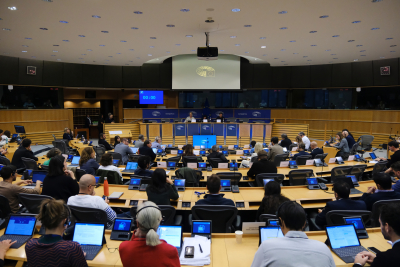Recent allegations of Members of the European Parliament (MEPs) receiving payments to spread Russian propaganda have highlighted once more the European Parliament’s failure to protect its own democratic integrity. Incredulously, taking-money-from-foreign-dictators aside, MEPs could have taken bucketloads of cash to appear on podcasts, talk shows and the like to parrot Russian propaganda, provided this was declared appropriately.
This is because MEPs have always been allowed to have any number of jobs on the side, with little scrutiny by the European Parliament. In fact, our new analysis can reveal that one in four Members of the European Parliament have collectively declared outside earnings to the tune of a whopping 8.7 million euros per year. The analysis draws on data extracted from MEPs’ own declarations of private interests, in which they must detail any income they receive outside of their mandate. The declarations are featured on our updated Integrity Watch EU database.
This opens up a litany of conflict-of-interest risks. How can European citizens be sure their elected representatives are acting in the public interest, if they’re contracted by outside companies?
In fact, some MEPs receive remuneration from companies all while conducting parliamentary activity focused on the same sector as those companies. Take MEP Axel Voss, for example, who wrote an opinion on the EU’s Artificial Intelligence Act, all while sitting on the data protection advisory board at German telecommunications giant Deutsche Telekom.
Our findings highlight some uncomfortable truths about the Qatargate scandal and the attempted reforms to MEPs’ internal rules on transparency and integrity that ensued. MEPs could have reformed their internal rules and banned paid side jobs. They chose not to. Instead, MEPs simply decided to mandate a new declaration of private interests, in which MEPs would, theoretically, be bound to be more precise in reporting both side activities and income. In fact, these declarations are a step backwards from their previous declarations, because MEPs are now only required to declare side income above a threshold of 5000 euros per year, while they were previously required to declare any income they earn on the side.
We’ve had a look at these new declarations and what they reveal about the scale of side jobs in the European Parliament.
70% of all MEPs perform some sort of side activity, whether paid or unpaid. That’s a total of 1751 side activities, or an average of two per MEP. It’s worth keeping in mind that all MEPs earn around 120,000 euros a year, without considering allowances, for their full-time jobs as elected representatives of the European public. Yet a huge majority of them are still dedicating time to jobs on the side—both paid and unpaid. Not only does this blur the lines between personal interests and political priorities, but it also invites questions about the true motivations behind MEPs’ actions. In fact, over one in four MEPs has a paid side gig. When totalled, MEPs’ annual side income amounts to a whopping 8,707,651.81€ per year.
So what exactly are MEPs doing on top of their busy schedules as elected representatives?
- We found a board member of a large multinational company that is also a registered organisation on the EU lobby register.
- A farmer that is also a member of the committee on agriculture
- An executive board member of a company handling “technology around payment systems” while having drafted multiple sector-relevant legislations.
- A lawyer for a law firm that claims to be “profoundly influenced by EU law” with offices in Paris and Brussels.
- We also found more obscure careers descriptions, such as “self-employed commercial activity”, and “renewable energy business plans” or “partnership of a general partnership”.
However, the overwhelming majority activities (82%) are board memberships.
We also found that a mere 5% of activities are shareholdings or business partnerships. The low number of activities in this last category might owe to the fact that only shareholdings or business partnerships that give rise to public policy implications or grant the shareholder significant influence need to be declared. But deciding whether their shareholdings fall under this definition is left entirely to MEPs’ discretions.
Let’s have a closer look at what sorts of MEPs are doing paid side jobs. Here’s a breakdown by political group:
Our analysis exposes that MEPs in the centre, and on the right and far-right side of the political spectrum (RE, EPP, ECR, ID) are likelier to have paid side gigs and make more money on average than those on the left. Non-aligned (NA) members have such high average side income largely due to a singular MEP: the Lithuanian Viktor Uspaskich earns around three million euros a year on the side.
This squares with their voting records. MEPs to the right overwhelmingly voted against an amendment (AM 22) that would have banned them from engaging in paid lobbying activities for entities registered on the EU Transparency Register. So, those benefiting the most from the current lax rules are also most reluctant to change them.
This phenomenon becomes even starker if we look at the European Parliament’s top earners. 16 out of the European Parliament’s top 20 highest side earners are from groups on the right (EPP, ECR, ID and three right-wing non-aligned members). Two remaining MEPs are from centrist group Renew (RE) and another two from the centre-left Socialists and Democrats (S&D) group
Only four of these 20 voted for the side jobs amendment. 13 voted against, and three were not present at the vote. It’s worth noting that the top six earn more from their side jobs than from their salaries as MEPs.
What about by country? Unsurprisingly, Lithuanian MEPs have the largest income on average, which is entirely down to Mr. Uspaskich, followed by Malta, Hungary, Greece and Slovakia. These four countries have all recently found themselves in hot water over democratic backsliding and rule of law concerns. On the other end, Cyprus, Sweden, the Netherlands are the countries with the lowest average side income. Not a single Cypriot MEP earns anything on the side.
So how accurate are these new declarations really?
Our previous research highlighted the scale of imprecise, erroneous or potentially misleading activity descriptions, meaning that they missed key information that would effectively identify and prevent conflicts of interest. While the new declarations are more precise, our analysis found a host of unaddressed issues:
- Convoluted ways of reporting income, which require interpretation
- Citing non-disclosure agreements to avoid reporting income or declaring income in a range to avoid naming a precise figure
- Declaring ownership of or involvement in multiple profitable businesses, without declaring any personal income
- Declaring a high income through an executive board membership of a large multinational company, without providing the name of the entity concerned
- MEPs suddenly declaring high-income generating activities without ever having updated their declarations before.
This is further proof that scrutiny of these declarations need more robust scrutiny in the European Parliament, and that MEPs continue to engage with influential organisations. One in eight activities in the European Parliament remain on behalf of organisations on the lobby register, in line with our previous findings. MEPs can’t be allowed to treat declarations of interests that may conflict with those of the public as a box-ticking exercise—or as a game.
So, with over eight million euros on the side for MEPs, those that benefit from the lax rules also profit from them the most, while others may have gotten away with incorrect declarations. European citizens deserve better than to be discarded by politicians distracted by their side incomes, and it’s time the European Parliament recognised it. Given that the European Parliament elections are just over a month away, now is the time to demonstrate to citizens that their elected representatives are taking their interests seriously.
Here’s what needs to happen:
The European Parliament should ban MEPs from engaging in side activities, paid or unpaid, with organisations that are seeking to influence EU policy-making. In the absence of such a ban, the following rules should be implemented:
- Clearer information should be requested in MEP declarations of private interests, such as precise reporting of income. The free text option should be limited.
- Parliament should implement detailed checks on the declarations. The “general plausibility check” is not enough, as too many mistakes persist. Each declaration should be checked.
- In case of a perceived conflict of interest, MEPs should not be allowed to hold any office of power related to that conflict, including being a rapporteur or shadow rapporteur on a file.






